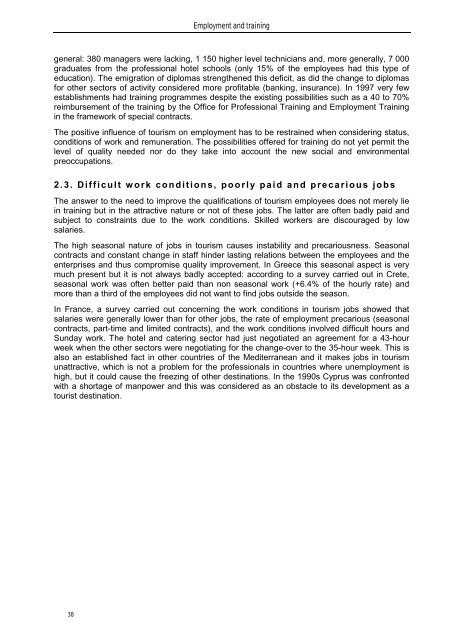dossier sur le tourisme et le développement durable
dossier sur le tourisme et le développement durable
dossier sur le tourisme et le développement durable
You also want an ePaper? Increase the reach of your titles
YUMPU automatically turns print PDFs into web optimized ePapers that Google loves.
38<br />
Employment and training<br />
general: 380 managers were lacking, 1 150 higher <strong>le</strong>vel technicians and, more generally, 7 000<br />
graduates from the professional hotel schools (only 15% of the employees had this type of<br />
education). The emigration of diplomas strengthened this deficit, as did the change to diplomas<br />
for other sectors of activity considered more profitab<strong>le</strong> (banking, in<strong>sur</strong>ance). In 1997 very few<br />
establishments had training programmes despite the existing possibilities such as a 40 to 70%<br />
reimbursement of the training by the Office for Professional Training and Employment Training<br />
in the framework of special contracts.<br />
The positive influence of tourism on employment has to be restrained when considering status,<br />
conditions of work and remuneration. The possibilities offered for training do not y<strong>et</strong> permit the<br />
<strong>le</strong>vel of quality needed nor do they take into account the new social and environmental<br />
preoccupations.<br />
2.3. Difficult work conditions, poorly paid and precarious jobs<br />
The answer to the need to improve the qualifications of tourism employees does not merely lie<br />
in training but in the attractive nature or not of these jobs. The latter are often badly paid and<br />
subject to constraints due to the work conditions. Skil<strong>le</strong>d workers are discouraged by low<br />
salaries.<br />
The high seasonal nature of jobs in tourism causes instability and precariousness. Seasonal<br />
contracts and constant change in staff hinder lasting relations b<strong>et</strong>ween the employees and the<br />
enterprises and thus compromise quality improvement. In Greece this seasonal aspect is very<br />
much present but it is not always badly accepted: according to a <strong>sur</strong>vey carried out in Cr<strong>et</strong>e,<br />
seasonal work was often b<strong>et</strong>ter paid than non seasonal work (+6.4% of the hourly rate) and<br />
more than a third of the employees did not want to find jobs outside the season.<br />
In France, a <strong>sur</strong>vey carried out concerning the work conditions in tourism jobs showed that<br />
salaries were generally lower than for other jobs, the rate of employment precarious (seasonal<br />
contracts, part-time and limited contracts), and the work conditions involved difficult hours and<br />
Sunday work. The hotel and catering sector had just negotiated an agreement for a 43-hour<br />
week when the other sectors were negotiating for the change-over to the 35-hour week. This is<br />
also an established fact in other countries of the Mediterranean and it makes jobs in tourism<br />
unattractive, which is not a prob<strong>le</strong>m for the professionals in countries where unemployment is<br />
high, but it could cause the freezing of other destinations. In the 1990s Cyprus was confronted<br />
with a shortage of manpower and this was considered as an obstac<strong>le</strong> to its development as a<br />
tourist destination.
















